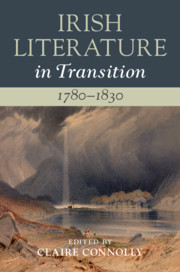Book contents
- Irish Literature in Transition, 1780–1830
- Irish Literature in Transition
- Irish Literature in Transition, 1780–1830
- Copyright page
- Contents
- Contributors
- Series Preface
- General Acknowledgements
- Acknowledgements
- Introduction
- Part I Origins
- Part II Transitions
- Chapter 3 Irish Literary Theory: From Politeness to Politics
- Chapter 4 Whigs, Weavers, and Fire-Worshippers: Anglophone Irish Poetry in Transition
- Chapter 5 Metropolitan Theatre
- Chapter 6 Harps and Pepperpots, Songs and Pianos: Music and Irish Poetry
- Chapter 7 Enlightened Ulster, Romantic Ulster: Irish Magazine Culture of the Union Era
- Part III Reputations
- Part IV Futures
- Index
Chapter 3 - Irish Literary Theory: From Politeness to Politics
from Part II - Transitions
Published online by Cambridge University Press: 28 February 2020
- Irish Literature in Transition, 1780–1830
- Irish Literature in Transition
- Irish Literature in Transition, 1780–1830
- Copyright page
- Contents
- Contributors
- Series Preface
- General Acknowledgements
- Acknowledgements
- Introduction
- Part I Origins
- Part II Transitions
- Chapter 3 Irish Literary Theory: From Politeness to Politics
- Chapter 4 Whigs, Weavers, and Fire-Worshippers: Anglophone Irish Poetry in Transition
- Chapter 5 Metropolitan Theatre
- Chapter 6 Harps and Pepperpots, Songs and Pianos: Music and Irish Poetry
- Chapter 7 Enlightened Ulster, Romantic Ulster: Irish Magazine Culture of the Union Era
- Part III Reputations
- Part IV Futures
- Index
Summary
This chapter explores romantic-era interest in the philosophy of mind, particularly in vitalism-influenced work by contributors to the Polite Literature section of the Transactions of the Royal Irish Academy: Robert Burrowes, William Preston, and Richard Stack. A medical theory that emerged in the mid-1700s, vitalism is concerned with bodily operations that are neither volitional nor recognisably mechanical – ‘involuntary motions’, as Robert Whytt termed them, such as breathing, reflexes (including ticklishness), and the pulse. Vitalism spoke to that which was outside conscious regulation, including reactions to stimuli, and so resonated with interests from the creative process and aesthetic response to public order. For the writers considered here, agency consists in the effort, supported by education and social networks, to manage an experience persistently complicated by involuntary impulses and external forces.
- Type
- Chapter
- Information
- Irish Literature in Transition, 1780–1830 , pp. 69 - 84Publisher: Cambridge University PressPrint publication year: 2020
- 1
- Cited by

